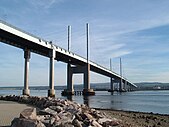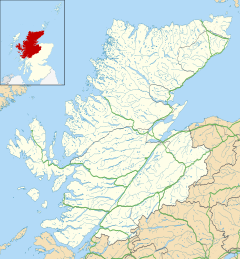Inverness
| |
|---|---|
| City of Inverness | |
Inverness skyline and the River Ness Public Library | |
Location within the Highland council area | |
| Coordinates: 57°28′40″N 4°13′29″W / 57.4778°N 4.2247°W | |
| Council area | Highland |
| UK Parliament | Inverness, Skye and West Ross-shire |
| Scottish Parliament | Constituency: Inverness and Nairn Region: Highlands and Islands |
| Historic county | Inverness-shire |
| Country | Scotland |
| Sovereign state | United Kingdom |
| First settled | Before the 6th century AD |
| Royal Charter | C. 12th Century AD |
| City status | 2000 |
| Area | |
| • Locality | 24.3 km2 (9.4 sq mi) |
| • Urban | 31.3 km2 (12.1 sq mi) |
| Population (2022)[3] | |
| • Locality | 47,790 |
| • Rank | 12th, Scotland |
| • Density | 2,000/km2 (5,100/sq mi) |
| • Urban | 63,730 |
| • Urban density | 2,000/km2 (5,300/sq mi) |
| • Metro | 81,968 |
| • Language(s) | English Scots Gaelic |
| Demonym | Invernesian |
| Postcode | |
| Area code | 01463 |
Inverness (/ˌɪnvərˈnɛs/ ; Scots: Innerness;[5] from the Scottish Gaelic: Inbhir Nis [iɲɪɾʲˈniʃ], meaning "Mouth of the River Ness") is a city in the Scottish Highlands, having been granted city status in 2000.[6] It is the administrative centre for The Highland Council[7] and is regarded as the capital of the Highlands.
Historically it served as the county town of the county of Inverness-shire. Inverness lies near two important battle sites: the 11th-century battle of Blàr nam Fèinne against Norway which took place on the Aird, and the 18th century Battle of Culloden which took place on Culloden Moor.[8] It is the northernmost city in the United Kingdom and lies within the Great Glen (Gleann Mòr) at its northeastern extremity where the River Ness enters the Beauly Firth. At the latest, a settlement was established by the 6th century with the first royal charter being granted by Dabíd mac Maíl Choluim (King David I) in the 12th century. Inverness and Inverness-shire are closely linked to various influential clans, including Clan Mackintosh, Clan Fraser and Clan MacKenzie.[9]
The population of Inverness grew from 40,969 in 2001 to 46,969 in 2012, according to World Population Review.[10] The Greater Inverness area, including Culloden and Westhill, had a population of 56,969 in 2012. In 2016, it had a population of 63,320.[11] Inverness is one of Europe's fastest growing cities,[12] with a quarter of the Highland population living in or around it.[13] In 2008, Inverness was ranked fifth out of 189 British cities for its quality of life, the highest of any Scottish city.[14]
- ^ "Thomas Brinkhoff: City Population, United Kingdom: Major Cities in Scotland". Retrieved 16 April 2024.
- ^ "City Population, United Kingdom: Urban Areas in Scotland". Retrieved 16 April 2024.
- ^ "Mid-Year Population Estimates, UK, June 2022". Office for National Statistics. 26 March 2024. Retrieved 3 May 2024.
- ^ "Click here to download the Inverness area profile | Have Your Say Inverness | Engage Highland".
- ^ "Scots Online Dictionary". Retrieved 17 October 2022.
- ^ Undiscovered Scotland: City Status in Scotland
- ^ The Highland Council website Archived 20 July 2007 at the Wayback Machine. Retrieved 6 March 2006.
- ^ "Inverness city". Inverness-scotland.com. Archived from the original on 4 July 2010. Retrieved 14 July 2010.
- ^ MacKenzie, Alexander (1894). History of the Mackenzies: With Genealogies of the Principal Families of the Name. Inverness: A & W MacKenzie.
- ^ "Inverness: Population". World Population Review.
- ^ "Mid-2016 Population Estimates for Settlements and Localities in Scotland". National Records Scotland (NRS). 31 May 2013. Retrieved 31 January 2021.
- ^ "Inverness: the new Shangri-La?". Newstatesman.com. 26 March 2007. Archived from the original on 27 September 2012. Retrieved 30 October 2012.
- ^ "Overview of Inverness". Scottish-places.info. Archived from the original on 8 September 2010. Retrieved 14 July 2010.
- ^ "Is your home recession proof?". The Daily Telegraph. London. 7 February 2008. Archived from the original on 9 June 2008. Retrieved 14 July 2010.








